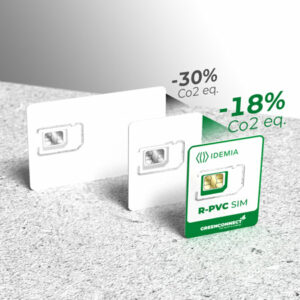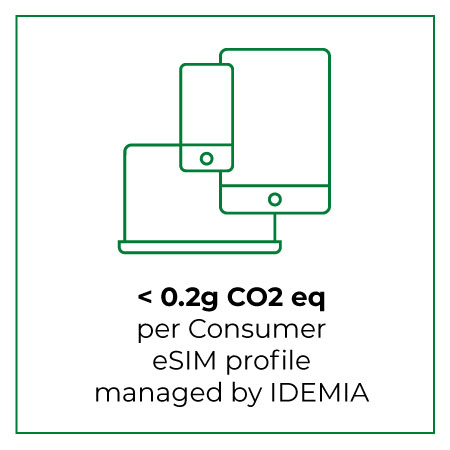Making sustainability simple

In September 2022, IDEMIA engaged external auditing experts to perform Life Cycle Assessments on its Consumer, M2M, and GREENCONNECT eco-friendly SIMs and its Consumer eSIM solution to substantiate and quantify the environmental footprint of these products. To go even further and ensure that IDEMIA’s environmental claims had indisputable credibility on the market, the Group tapped Bureau Veritas—a global leader in laboratory testing, inspection, and certification services—to verify the environmental assessments previously carried out by external auditing experts.
This marks a significant milestone for IDEMIA as it is now the first company in the telecommunications industry to have its Life Cycle Assessments verified by Bureau Veritas.
Life Cycle Assessment is currently the most comprehensive environmental impact evaluation method which tests the environmental footprint of a product in compliance with the international standards for lifecycle assessments ISO 14040 and ISO 14044.
The analyses cover Consumer, GREENCONNECT, and M2M ranges on removable form factors, as well as Consumer eSIMs.
Full verification of the Life Cycle Assessments by Bureau Veritas comes at a time when more and more telecommunications industry stakeholders are committed to reducing the environmental impact of their activities.
According to a GSMA report published in May 2022, mobile operators representing 62 percent of the industry by revenue have committed to rapidly reducing emissions over the next decade.1
The Greenhouse Gas (GHG) Protocol divides carbon-emitting activities into three scopes to better measure emissions, i.e., Scope 1 covering direct production, Scope 2 for emissions from external energy supplies owned or controlled by a company, and Scope 3 linked to emissions in the supply chain that come from sources not owned or controlled by a company.
While it is easier for companies to quantify and manage their Scope 1 and 2 emissions, Scope 3 emissions, which accounts for the largest proportion of total emissions, are highly dependent on the eco-ambitions of suppliers and are the most difficult to reduce.
GSMA estimates that approximately 70 percent of mobile operators’ total GHG emissions belong to scope 3 emissions.
Consequently, it is important to quantify the carbon footprint of a product, to first understand its contribution to Scope 3 emissions and to then assess potential opportunities to reduce emissions emerging from product redesign.
Below are some of notable findings from the Life Cycle Assessments verified by Bureau Veritas:
 Compared to the full-sized credit card format, half-size SIMs bring an estimated 30 percent carbon dioxide (CO2) reduction on product eco-performance. Additional benefits not included in this figure are linked to logistics, as more half-sized SIMs can be shipped per pallet.
Compared to the full-sized credit card format, half-size SIMs bring an estimated 30 percent carbon dioxide (CO2) reduction on product eco-performance. Additional benefits not included in this figure are linked to logistics, as more half-sized SIMs can be shipped per pallet.
Using recycled plastics such as R-PVC to manufacture SIMs can result in up to 18 percent less CO2 emissions per card.
 eSIM represents a strong asset in the carbon reduction strategy of mobile operators. It is estimated that the generation and download of a single consumer eSIM profile by IDEMIA Smart Connect Consumer solution has an impact of less than 0.2g CO2 equivalent. IDEMIA eSIM solutions are hosted on the public cloud of Microsoft Azure, which is strongly committed to reducing carbon emissions.2
eSIM represents a strong asset in the carbon reduction strategy of mobile operators. It is estimated that the generation and download of a single consumer eSIM profile by IDEMIA Smart Connect Consumer solution has an impact of less than 0.2g CO2 equivalent. IDEMIA eSIM solutions are hosted on the public cloud of Microsoft Azure, which is strongly committed to reducing carbon emissions.2
We are happy to have received this verification from Bureau Veritas, which helps ensure that claims on the environmental footprint of our products are reliable and substantiated, thus serving as a testament to our commitment to take the telecommunications industry to the next level in environmental protection.
Yves Portalier, SVP Corporate Social Responsibility at IDEMIA
By using IDEMIA’s eco-friendly SIMs and eSIMs, whose environmental footprints have been independently quantified and verified, mobile operators can better position themselves to reduce their carbon emissions and align their carbon reduction ambitions on the eco-design roadmap.
IDEMIA will continue to support mobile operators on their journey towards sustainable connectivity and to achieve net-zero carbon emissions by 2050.
Yves Portalier
IDEMIA currently chairs the Sustainability Working Group of the Trusted Connectivity Alliance which aims to help mobile operators reduce Scope 3 emissions.3
[1] https://www.gsma.com/newsroom/press-release/gsma-reports-62-of-mobile-sector-to-cut-emissions-this-decade/
[2] https://azure.microsoft.com/en-us/explore/global-infrastructure/sustainability/#overview
[3] https://trustedconnectivityalliance.org/how-can-supply-chains-help-improve-the-environment-credentials-of-the-sim-industry/